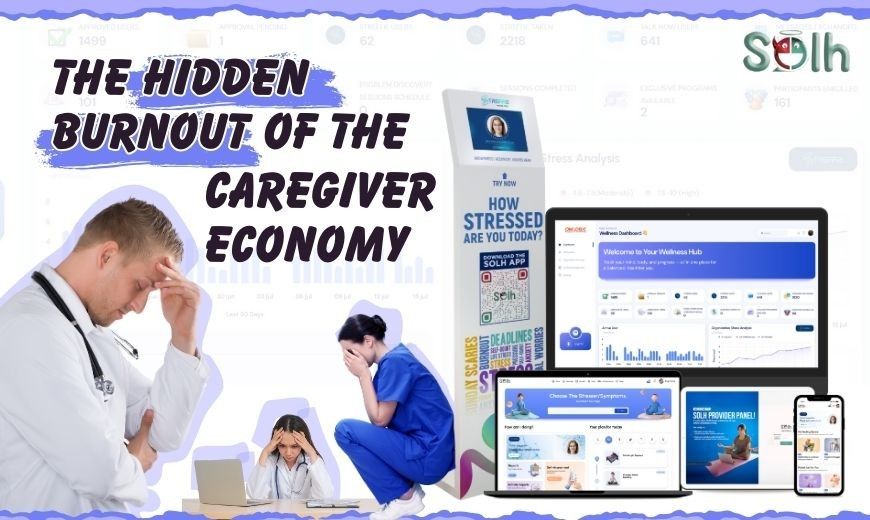Quick Summary
Caregiver burnout is quietly breaking the backbone of healthcare. Doctors, nurses, and frontline healthcare professionals are absorbing trauma faster than they can recover from it.
This blog reveals what causes caregiver burnout, why compassion fatigue is rising in hospitals, and how Solh’s Guided Plans, Streffie Kiosk, and emotional regulation tools support healthcare workers through a comprehensive stress-management ecosystem.
Healthcare Runs on Caregivers — Until Caregivers Collapse
Hospitals run on people who haven’t rested.
Clinics run on people who haven’t processed anything they’ve seen.
ERs run on people who break down in private so they can stay composed in public.
Doctors and nurses are expected to carry pain without being affected by it.
But even steel bends.
Caregiver burnout isn’t personal failure.
It’s the inevitable outcome of a system that takes emotional strength for granted.
What Causes Caregiver Burnout (For Doctors & Nurses)?
Burnout in healthcare is a slow casualty.
A quiet drowning.
It builds through:
- relentless shifts
- emergency overload
- witnessing trauma daily
- pressure from patients’ families
- fear of fatal mistakes
- guilt over not being “strong enough”
- the emotional weight of being the last hope
Stress management for healthcare workers fails
because the culture demands perfection
but offers no recovery.
Compassion Fatigue: When Caring Stops Feeling Like Care
Doctors and nurses don’t lose empathy because they don’t care.
They lose empathy because they have cared too much, for too long, without rest.
Compassion fatigue shows up as:
- emotional detachment
- irritation
- memory lapses
- numbness
- hesitation
- increased errors
- deep mental exhaustion
If you don’t know how to prevent compassion fatigue,
you don’t see it coming until it has already taken over.
Healthcare Is the Epicenter of Emotional Exhaustion
Healthcare is the only profession where you must absorb:
- someone’s fear
- someone’s pain
- someone’s panic
- someone’s loss
- someone’s last breath
And show up again the next morning — as if nothing happened.
This is why stress management for healthcare professionals is not optional.
It’s essential infrastructure.
The Real Problem: No Recovery Protocol
Healthcare teaches technique, precision, procedure.
But never:
- emotional regulation
- nervous system recovery
- psychological offloading
Resilience doesn’t fail.
Systems fail.
People break because they’re unsupported.
Doctors and nurses don’t need “motivation.”
They need tools for reducing emotional exhaustion.
How Solh Supports Healthcare Caregivers
Solh is not a perk.
Solh is a comprehensive stress-management ecosystem built for people who carry the emotional weight of humanity.
1. Streffie Kiosk — Measuring Stress Objectively
Healthcare workers don’t always say they’re stressed.
But Streffie says what they can’t.
By scanning 68 facial points, Streffie detects stress levels to determine burnout signals at an early stage.
This isn’t judgment.
It’s clarity.
Keyword coverage: Streffie kiosk, healthcare wellbeing, stress support services
2. Guided Plans for Stress Relief (7–14–21 Days)
When your shift is 10 hours long, “self-care” is a joke.
Doctors and nurses need structured, regulated, science-based recovery.
Solh’s Guided Plans offer:
- daily micro-recovery
- grounding tools
- nervous system resets
- emotional regulation practices
Real recovery, delivered in minutes — not hours.
Keywords covered: guided plans for stress relief, emotional regulation tools
3. Solh Buddy — Everyday Emotional Support
A human-supervised AI companion designed for people who carry the emotional load of others.
At 3 AM.
After a loss.
After a tough case.
After a moment that shakes you.
It provides mental health support for healthcare workers that fits the reality of their life — private, immediate, judgment-free.
4. Solh Library — Tools for Moments That Hurt
Healthcare professionals don’t get time.
They get seconds.
Solh’s library includes over 1,000+ tools for:
- grounding
- breathwork
- emotional regulation
- psychological decompression
- quick reflection
Tools designed for people who don’t get to take breaks — but still need them.
Healthcare Doesn’t Need Stronger Caregivers
It needs supported caregivers.
Caregiver burnout doesn’t happen because doctors and nurses aren’t tough.
It happens because they’ve been tough for too long
without recovery, without acknowledgment, without emotional protection.
Solh gives them what the system never did:
a way to come back to themselves.
Truth Shot
Caregiver burnout isn’t a lack of resilience.
It’s emotional overload without recovery —
and healthcare cannot afford to lose the people who hold it together.



